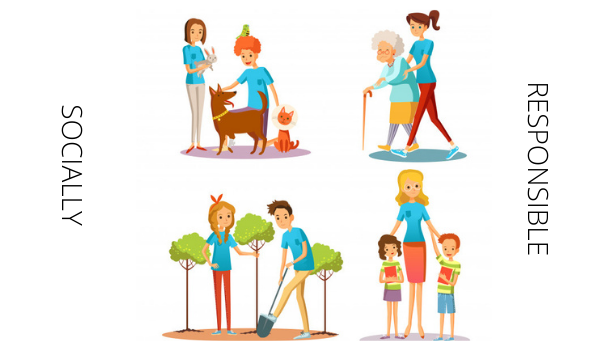Hiring the right talent is tough, but hiring someone who is also socially responsible is even more so. As important as corporate social responsibility is for a company, sometimes the right talent can actually steer a company towards the avenue of social responsibility.
The right candidates may be able to maintain the equilibrium of fulfilling their duty towards the organisation they join and give back to the society through their work. Ethics has a big role to play in determining whether a person is socially responsible or just another paycheck chaser.
“Socially responsible people will not leave the organisation because they see value in such organisations.”
SV Nathan, partner and chief talent officer, Deloitte India
As Sunil Ranjhan, executive VP HR, Maruti Suzuki, rightly puts it, “Such people, when it comes to their workplaces, are the ones who will go beyond the natural call of duty. They will not go strictly by the job description, or adhere to the 9-5 kind of a role. They will be naturally comfortable taking up causes for the greater good.”
“These candidates will always look at the bigger picture and tend to believe in the greater good. “When employees are socially responsible, their ability to see the various data points across is better and they create more inclusive solutions,” agrees Reetu Raina, CHRO, Quick Heal.
People’s person
People who care for the greater good will care for their coworkers too. Empathy, ability to work in teams and foster a culture of inclusivity is all a part of such candidates.
“It is imperative to ask candidates about the kind of issues they identify with, what they would do if they had adequate resources and the motive behind taking up certain initiatives or causes.”
Sunil Ranjhan, executive VP HR, Maruti Suzuki
“Most work in collaborative corporations and it makes sense to hire team workers, and social workers tend to be ideal, as their values align with the company values. Socially-responsible people are likely to care for other co-workers, and to that extent they are likely to be better team players, and in context, likely to be better at overall team effectiveness,” says Kamalesh Dangi, group head – HR, InCred.
SV Nathan, partner and chief talent officer, Deloitte India points out how employees who are the right fit for a firm tend to stick around for longer and return even if they leave in the future. “Such people will not leave the organisation because they see value in such organisations. They get the best of both worlds,” he opines.
Diamond in a sea of coal
The right talent is difficult to come by, especially the ones who are wholesome in fulfilling their socially responsibility and sharing the same values as that of the organisation concerned. Nathan, says finding such talent is difficult and as cumbersome as “looking for a needle in a haystack”.
“When employees are socially responsible, their ability to see the various data points across is better and they create more inclusive solutions.”
Reetu Raina, CHRO, Quick Heal
“Many a time, candidates are so engrossed in securing a job, that they don’t give us a glimpse of who they are as persons inside or people within,” says Nathan trying to explain how the majority of companies, including Deloitte, take time to find that diamond in the rough.
He further reveals how, through an exclusive CSR initiative called ‘Impact Day’, they try to identify the socially-responsible employees. “This can be seen within about 8-12 months, when we get to know people at an intimate level, beyond work,” he adds.
This year, InCred, the online financial services platform, hired an employee who not only shares similar values but also gives back to the society. Such coincidences on the hiring day itself is rare, but again, this depends on the kind of company.
Right questions and assessment
The seriousness of a socially active candidate towards the cause can be assessed through their social media presence.
“Socially-responsible people are likely to care for other co-workers, and to that extent they are likely to be better team players, and in context, likely to be better at overall team effectiveness.”
Kamalesh Dangi, group head – HR, InCred
There will be candidates who tend to be active on social media for a social cause without any or little on-ground activity. These candidates may or may not be serious about the cause, and would just do it for the sake of it.
In such cases it becomes vital to ask pointed questions and as Ranjhan mentions how it is imperative to ask candidates about the kind of issues they identify with, what they would do if they had adequate resources and the motive behind taking up certain initiatives or causes. Such questions tend to bring out whether it is merely a personal branding or whether the candidates actually care for the cause they have posted on social media.
Quick Heal, for instance, assesses its candidates using the aggressive Behavioural Event Interview (BEI), especially when it comes to social-media content and more for their past projects and volunteering events. While this effectively helps in choosing the right candidate, it also exposes the DNA of a candidate and helps determine whether they are actually socially responsible.
The wrong fitment
As always, there is a downside to it. Socially-responsible candidates for the wrong company can endanger their own position and create conflict for the company concerned. If candidates who are very keen on social issues, say plastic pollution, end up getting hired by a beverage company that churns out thousands of plastic bottles every day, it is definitely a recipe for disaster.
In such cases, a thorough screening with a panel that can recognise friction is the best way out.
Value our content... contribute towards our growth. Even a small contribution a month would be of great help for us.
Since eight years, we have been serving the industry through daily news and stories. Our content is free for all and we plan to keep it that way.
Support HRKatha. Pay Here (All it takes is a minute)








































